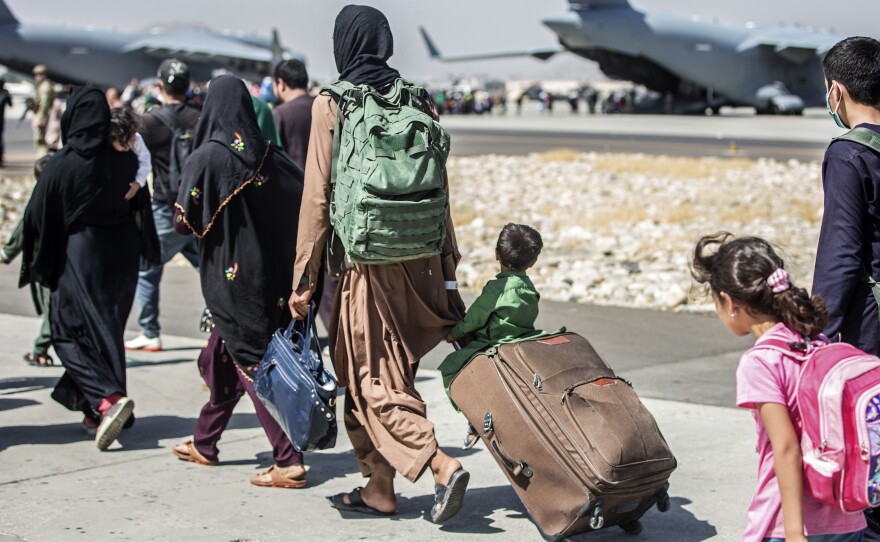Given the chaotic and violent scenes at the Kabul airport, Afghans who worked for the Americans are increasingly desperate to flee, along with Americans still in Afghanistan. Some of them are reaching out to friends, volunteers and veterans groups ahead of the U.S. deadline ending evacuations.
Shawn VanDiver, a Navy vet, is with the San Diego chapter of the Truman National Security Project. Since the exodus from Kabul happened nearly two weeks ago, he’s been a busy man. He had to stop answering questions over Zoom to check in on another Afghan trying to make their way to the US.
“Nothing like this has ever happened before,” he said. “This is the most uniquely American thing I’ve ever seen. People who don’t do this. They’re just holding themselves up, getting out. I’m working from 4 a.m. to midnight every day for people that we’ve never met.”
RELATED: The Attacks Outside Kabul Airport Push The U.S. Exit Into Deeper Disarray
Supporters call it a Digital Dunkirk, named after the operation during World War II, when hundreds of pleasure boats were pressed into service to rescue British troops trapped in France. Established veterans groups, like No One Left Behind have worked for years to bring military translators back to the US, They’re now working alongside hastily assembled vet coalitions, like VanDiver’s #AFGHANEVAC.
They’re connecting Afghans with resources at the state department, while they try to discourage American volunteers from making the chaos worse. In recent days charter flights have left the Hamid Karzai International Airport in Kabul nearly empty because their passengers had not cleared the checkpoints in time to get on the flight.
It’s heartbreaking work.
Desperate Afghans are reaching out, including one man who worked for an American contractor at Bagram Air Force base in the 2000s.
“For the humanity. For the sake of God. I am begging them. Save my children,” said one man from Kabul, during a phone interview with KPBS.
He reached out to a San Diego woman over the Internet, who turned over his paperwork to the U.S. State Department and, on the man’s request, to KPBS. We're not using his name, or any identifying information, for his security. He’s still trying to figure out the visa process.
“I have a lot of friends, they know me…(sigh) I helped them. Now it’s my time for them to help me,” he said.
RELATED: 3 California Families Get Out Of Afghanistan To Safety
American veterans of the War in Afghanistan are hearing from former translators through emails and texts. They are asking for their help.
“Afghan vets have contacts over there. They’re getting these messages. These desperate pleas for help,” said Kristopher Goldsmith is a veterans advocate and Iraq War vet. He lost touch with his unit’s translator when ISIS took over. A week ago, he created “Evacuate Our Allies.”
“The uncertainty for me is heavy, but the certainty of knowing that these desperate cries help, suddenly go silent. That’s going to be unimaginably tough, for many more people,” he said.
For veterans, coming to the aid of their Afghan allies is possibly the clearest objective of the 20-year war. The group is urging the White House to extend the deadline and cut through the red tape so more people can be airlifted out of Kabul, he said.
Mohamed is a translator who came to San Diego less than 2 years ago. It took him more than three years to go through the Special Immigration Visa program, though the law says the process is supposed to take no more than nine months. He still has members of his family trapped in Afghanistan. He’s also getting calls from other translators still there. One person spent 8 days in and around the airport before giving up and going back home.
“Last night he talked to me,” he said. “Do you know someone in the airport to help me. I said I can’t I don’t know someone, because right now everything has changed. Everything is in Taliban hands.”
For years, advocates have been frustrated by the time it takes for former translators to go through the SIV process. In the last week, the number of visa approvals jumped. At the moment, Afghans finish the process at one of four US military bases, before quickly moving to their final destination.
Etleva Bejko is with Jewish Family Services in San Diego. She says it’s a challenge just finding a place for them to stay.
“We got a call this morning saying we had a family arriving at 8:30 tonight and that’s all the prep time we got. The biggest challenge remains housing. San Diego has a housing crisis so dealing with that in such an emergency situation makes it even more difficult.”
RELATED: Biden Pledges To Strike Back After Attack Kills 12 U.S. Service Members In Kabul
They arrive with few belongings. Afghans receive government assistance, but groups on the ground in the U.S. are scrambling for essentials, like pots and pans and kids clothes. Since October California has taken in the most SIV recipients — 1,649, as of July — roughly double the number taken in by Texas, the state with the second highest total. That number will be rising. Jewish Family services is seeing roughly one new family a day since the pull-out began.
Aside from the new arrivals, U.S. citizens from San Diego are still on the ground in Afghanistan. Aside from a group of students from Cajon Valley Union School District, there are Americans of Afghan descent who are trying to find a way out of the country, before the last plan leaves.






